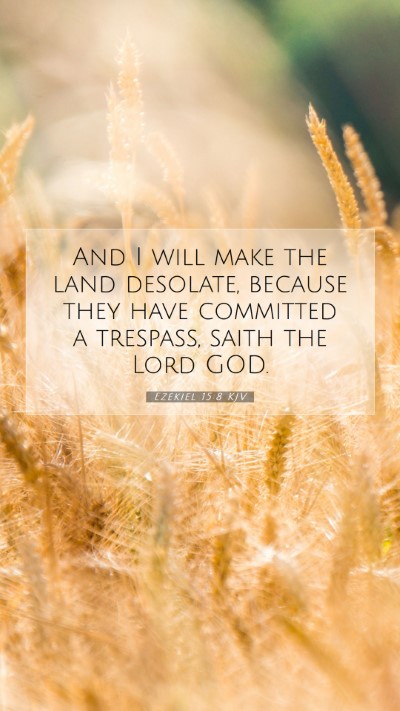Ezekiel 15:8 - Meaning and Interpretation
Verse Reference: Ezekiel 15:8
"And I will make the land desolate, because they have committed a trespass, saith the Lord GOD."
Overview
The verse from Ezekiel 15:8 serves as a powerful declaration of judgment, highlighting the consequences of sin and rebellion against God. This passage is part of a larger section in Ezekiel where God communicates his displeasure with Israel's unfaithfulness and the resulting desolation that will befall the land.
Bible Verse Meanings and Interpretations
Insights from various public domain commentaries provide a deeper understanding of this verse.
Matthew Henry's Commentary
Matthew Henry emphasizes that the image of the vine in this chapter represents the people of Israel and their relationship with God. He explains that just as a vine that does not bear fruit is useless and fit for destruction, so too Israel's disobedience leads to their judgment. The "desolation" referred to signifies not only physical destruction but also a spiritual emptiness caused by their rejection of God.
Albert Barnes' Notes on the Bible
Barnes elaborates on the idea of God making the land desolate as a consequence of Israel's trespasses. He argues that this judgment illustrates God’s righteousness—he cannot overlook sin. The "trespass" speaks not only of overt acts of rebellion but also of the neglect of God's commands. Barnes draws connections between this judgment and God's nature as one who is just and holy; thus, there are dire consequences for turning away from Him.
Adam Clarke's Commentary
Clarke discusses the symbolic meaning of the vine and how it represents Israel’s unfruitfulness. He argues that God’s desolation of the land serves as a warning to the people, showcasing the severity of their sins. Clarke also notes that desolation is not merely a punishment but reflects a state of abandonment when the people forsake their commitment to God, leading to their ruin.
Understanding the Themes
- Consequences of Sin: The verse conveys the message that sin has inevitable consequences, particularly in the relationship between God and His people.
- Judgment and Justice: The theme of divine judgment for unfaithfulness is prevalent throughout Ezekiel, illustrating God's justice that mandates punishment for disobedience.
- Spiritual Unfruitfulness: The vine serves as a metaphor for believers; without bearing fruit, they face spiritual desolation, emphasizing the importance of living in accordance with God’s will.
Cross References
- Isaiah 5:1-7: The parable of the vineyard, highlighting Israel's failure to produce good fruits.
- Jeremiah 2:21: God’s description of Israel as a choice vine that has become wild and unfruitful.
- John 15:1-6: Jesus' teaching on the vine and branches, emphasizing abiding in Him to bear fruit.
Application for Today
This verse offers significant insights for contemporary believers regarding the importance of maintaining a faithful relationship with God. It serves as a reminder of the dire consequences of turning away from God and the necessity of producing spiritual fruit in one’s life.
Bible Study Insights
In engaging with this verse, individuals or Bible study groups can reflect on their personal walk with God, assessing areas of unfruitfulness and seeking repentance and restoration. Online Bible study resources can aid in diving deeper into the historical context and theological implications of this scripture.
Conclusion
Ezekiel 15:8 underscores the profound truth of accountability in our relationship with God. The insights drawn from public domain commentaries deepen the understanding of this scripture, providing a clarion call for believers to examine their lives in light of God’s commandments. As one seeks to interpret Bible verses accurately, this passage collectively emphasizes the necessity of remaining faithful and fruitful in one's spiritual journey.


